Abortion
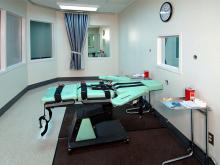
With these words the pope is also reshaping what it means to be “pro-life.” He is moving it away from primarily opposing abortion and stressing that it means protecting life at every stage, from womb to natural death.
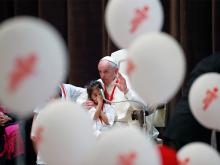
Prominent U.S. ethicists are among a number of international experts chosen by Pope Francis for his bioethics advisory board — a move that might temper the group’s conservative views on sexual morality and life issues.
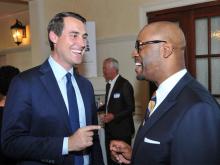
King is no latecomer on this issue. His views and his deep commitment to the LGBTQ community were shaped by his gay older brother’s suicide in the 1990s, an event that shook his family.
King’s sentiments were not unique, even for straight white believers like himself. What is unique is that they came from a candidate for governor of Florida who is running as both an evangelical Christian and a progressive Democrat.

Vice President Mike Pence — a onetime altar boy who became an evangelical Protestant — proclaimed President Donald Trump a faithful supporter of Catholic values at the National Catholic Prayer Breakfast, an event that sought to set aside any friction between the president and the pope.
“Let me promise all of you, this administration hears you. This president stands with you,” Pence said to the 1,300 gathered.

The determination to not let Runkles “walk” when she completes her studies at the Hagerstown school prompted a sharp critique from Students for Life of America, which asked its supporters to urge the school to reverse its decision.
But Hobbs said the school is standing its ground about the June 2 ceremony for Runkles’ class of 15 students.
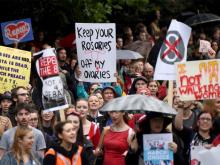
Ireland metaphorically barred the door on the church’s influence on public policy when citizens voted overwhelmingly for the legalization of gay marriage in 2015, making it the first country in the world to do so by national referendum. Now some devout Catholics fear that door may be locked after a Citizens’ Assembly — a deliberative body of people randomly selected from across the country — recently recommended liberal changes to Ireland’s abortion laws.
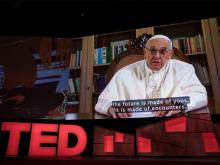
The talk — a surprise for all in the audience — recapitulated the key themes of the Argentinian pope’s view of the human person: We are all related and interconnected; scientific and technological progress must not be disconnected from social justice and care for the neighbor; and that the world needs tenderness.
I am a scholar of modern Catholicism and its relations with the world of today. From my perspective, there are two essential elements of this talk that are important to understand: the message of the pope and his use of the media.

The two major streams of Christian engagement on war are pacifism and just war theory, which comes out of Catholic social teaching. The pacifist response to Syria strikes is clearly opposed. As for the just war analysis, it takes a little explaining, but reaches the same conclusion.
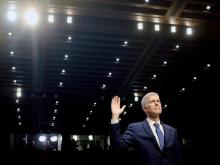
In Trump’s first nominee, Judge Neil Gorsuch, abortion foes were convinced they had the jurist who would fulfill Trump’s campaign promise to appoint justices who would deliver the reversal they have worked decades to achieve. But now, after last week’s hearings before the Senate Judiciary Committee, some are voicing concern that Gorsuch might not be such a reliable anti-Roe vote after all.

The May 13 speech at Liberty’s football stadium in Lynchburg, Va., will be Trump’s first commencement address as president, but it won’t be his first at Liberty, which describes itself as the largest Christian university in the world.
The then-presidential candidate spoke last year at the university’s Convocation, promising, “I will protect Christians,” and famously stumbling over a reference to “Two Corinthians.”
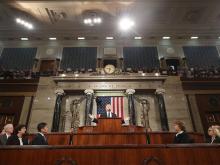
A day after his first speech to Congress, President Trump was still basking in unexpected praise from the public and some pundits, who saw in his delivery a man who finally came across as measured in tone and downright “presidential,” as some put it, even if his few policy prescriptions reiterated the hard line, nationalist agenda that propelled him to office.
But there is one key constituency that might not be as enamored with the address: social conservatives, whose support was arguably most critical to Trump’s election.
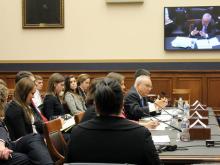
The former U.S. religious freedom ambassador told a congressional subcommittee that leaked language of a proposed presidential executive order on religious liberty could cause “constitutional problems.”
“I think it raises very serious equal protection issues,” said Rabbi David Saperstein, who recently ended his tenure at the U.S. State Department.
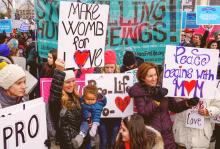
I went to the March for Life, mostly out of curiosity and a conviction to break out of my liberal bubble and some of my preconceived notions about pro-lifers. Instead, I was faced with a very bleak question: To be pro-life, do you have to support Donald Trump?
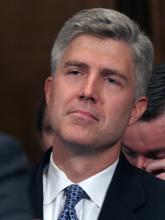
President Donald Trump announced his Supreme Court nominee to replace the late Justice Antonin Scalia, who died last February: Judge Neil Gorsuch. Here are five faith facts about the nominee.

A week after the inauguration of President Donald Trump, throngs of anti-abortion marchers gathered near the White House to applaud his administration’s actions and his plans to support their cause.
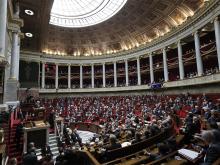
Since coming to power in 2012, the government has made abortion completely free as part of the National Health Service, scrapped a requirement that a woman must be “in distress” to obtain permission to abort, and dropped a weeklong “reflection period” between applying for and carrying out an abortion. It decided to act again in part because several anti-abortion sites were found to be ranked higher on search engines than the government’s own abortion information site. Although their home pages appear to be neutral, the sites and their advice hotlines — run mostly by Catholic anti-abortion activists — are on closer inspection clearly against abortion and stress the physical and psychological damage they say the procedure can cause.
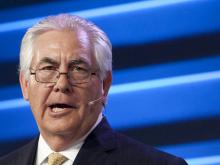
Donald Trump’s pick for secretary of state, ExxonMobil CEO Rex Tillerson, has come under fire for his friendship with Russian president Vladimir Putin – who is suspected of trying to tip the election to Trump – his lack of diplomatic experience, and the fact that he is a corporate bigwig who champions fossil fuels, even as the threat of global warming grows.
But Tillerson, whose nomination was announced on Dec. 13, may also face criticism from an unexpected quarter – social conservatives whose support was critical to Trump’s unexpected election last month.
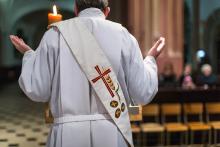
The Rev. Frank Pavone, a leading anti-abortion crusader and Donald Trump supporter, was jubilant on Nov. 9 after his candidate’s surprising win in the presidential race.
But the head of the Staten Island-based Priests for Life group is also facing a stern rebuke and investigation from his bishop, over Pavone’s shocking election eve video, in which he posed with an aborted fetus on an altar while delivering a 44-minute appeal to voters to elect the Republican nominee.

As a Christian who truly believes that abortion is a moral issue, I am deeply committed to dramatically reducing them. But criminalizing an often desperate choice is not the answer. We must also be deeply committed to the economic security, healthcare, and childcare choices that women need, which are critical to reducing abortion. I believe in the sacredness and dignity of life from womb to tomb. But a “consistent ethic of life” also ending poverty, human trafficking, the death penalty, ceaseless and senseless wars, and weapons of mass destruction.

For the first time in three general election debates, a moderator asked the presidential candidates on Oct. 19 about abortion.
Given that abortion has rightly been described as the source of America’s second civil war, there has been a baffling lack of engagement with it this election cycle.